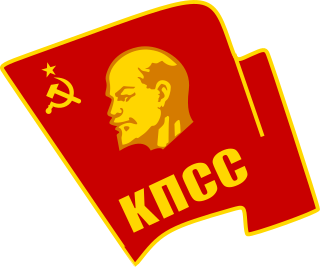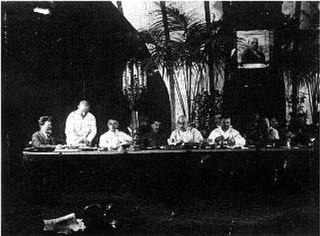Related Research Articles

The Political Bureau of the Central Committee of the Communist Party of the Soviet Union was the highest policy-making authority within the Communist Party of the Soviet Union. It was founded in October 1917, and refounded in March 1919, at the 8th Congress of the Bolshevik Party. It was known as the Presidium from 1952 to 1966. The existence of the Politburo ended in 1991 upon the breakup of the Soviet Union.

The Central Committee of the Communist Party of the Soviet Union was the executive leadership of the Communist Party of the Soviet Union, acting between sessions of Congress. According to party statutes, the committee directed all party and governmental activities. Its members were elected by the Party Congress.

The Orgburo, also known as the Organisational Bureau, of the Central Committee of the Communist Party of the Soviet Union existed from 1919 to 1952, when it was abolished at the 19th Congress of the Communist Party and its functions were transferred to the enlarged Secretariat.
The 9th Politburo, the 9th Secretariat and the 9th Orgburo of the Russian Communist Party (Bolsheviks) were elected by the 1st Plenary Session of the 9th Central Committee, in the immediate aftermath of the 9th Congress.

The Central Committee (CC) composition was elected by the 10th Congress, and sat from 16 March 1921 until 2 April 1922. The CC 1st Plenary Session renewed the composition of the Politburo, Secretariat and the Organizational Bureau (OB) of the Russian Communist Party (Bolsheviks).

The Central Committee (CC) composition was elected by the 11th Congress, and sat from 2 April 1922 until 25 April 1923 . The CC 1st Plenary Session renewed the composition of the Politburo, Secretariat and the Organizational Bureau (OB) of the Russian Communist Party (Bolsheviks).
The 7th Bureau and the 7th Secretariat of the Russian Communist Party (Bolsheviks) were elected by a Session of the 7th Central Committee in the immediate aftermath of the 7th Congress. The 7th Orgburo was elected by the twenty-fourth session of the 7th Central Committee, held on 16 January 1919.
The 8th Orgburo of the Russian Communist Party (Bolsheviks) was elected by the 1st Plenary Session of the 8th Central Committee, in the immediate aftermath of the 8th Congress.
The 10th Orgburo of the Russian Communist Party (Bolsheviks) was elected by the 1st Plenary Session of the 10th Central Committee, in the immediate aftermath of the 10th Congress.
The 11th Orgburo of the Russian Communist Party (Bolsheviks) was elected by the 1st Plenary Session of the 11th Central Committee, in the immediate aftermath of the 11th Congress.
The 12th Orgburo of the Russian Communist Party (Bolsheviks) was elected by the 1st Plenary Session of the 12th Central Committee, in the immediate aftermath of the 12th Congress.
The 13th Orgburo of the Russian Communist Party (Bolsheviks) was elected by the 1st Plenary Session of the 13th Central Committee, in the immediate aftermath of the 13th Congress.
The 14th Orgburo of the All-Union Communist Party (Bolsheviks) was elected by the 1st Plenary Session of the 14th Central Committee, in the immediate aftermath of the 14th Congress.
The 15th Orgburo of the All-Union Communist Party (Bolsheviks) was elected by the 1st Plenary Session of the 15th Central Committee, in the immediate aftermath of the 15th Congress.

The Central Committee (CC) composition was elected by the 12th Congress, and sat from 25 April 1923 until 31 May 1924. The CC 1st Plenary Session renewed the composition of the Politburo, Secretariat and the Organizational Bureau (OB) of the Russian Communist Party (Bolsheviks).

The Central Committee (CC) composition was elected by the 13th Congress, and sat from 2 June 1924 until 31 December 1925. The CC 1st Plenary Session renewed the composition of the Politburo, Secretariat and the Organizational Bureau (OB) of the All-Union Communist Party (Bolsheviks).
The Central Committee (CC) composition was elected by the 16th Congress, and sat from 13 July 1930 until 10 February 1934. Its 1st Plenary Session renewed the composition of the Politburo, Secretariat and the Orgburo of the All-Union Communist Party (Bolsheviks). The 16th Congress was the first party convention since the 13th Congress which saw no organized opposition, and the first congress in party history in which there was no opposition to the party leadership. Ukrainian historian Oleg Khlevniuk considers the period 1930–1934 to be a "transitional period" between collective leadership and Joseph Stalin's personal dictatorship (autocracy). The removal of Alexei Rykov, the Chairman of the Council of People's Commissars, from the Politburo at the 1st Joint Plenary Session of the CC and the Central Control Commission (CCC) has been marked in historic literature as "the definitive Stalinization of that body [Politburo]" according to Khlevniuk.

The Central Committee (CC) composition was elected at the 17th Congress, and sat from 10 February 1934 until 22 March 1939. Its 1st Plenary Session renewed the composition of the Politburo, Secretariat and the Orgburo of the All-Union Communist Party (Bolsheviks). The 17th Congress was labelled the "Congress of Victors" to mark the success of the first five-year plan and the collectivization of agriculture. The CC 1st Plenary Session elected Joseph Stalin General Secretary of the Central Committee, and Lazar Kaganovich continued to serve as Stalin's deputy, an informal post referred to by Sovietologists as Second Secretary, and was empowered to manage party business and sign Politburo resolutions when Stalin was away from Moscow.
The 18th Central Committee of the All-Union Communist Party (Bolsheviks) was elected by the 18th Congress, and was in session from 1939 until 1941. It elected, at its 1st Plenary Session, the 18th Politburo, the 18th Secretariat, the 18th Orgburo and the 18th Party Control Commission of the All-Union Communist Party (Bolsheviks).

The election of inner composition refers to the election of party officials to the Politburo, Secretariat and the Orgburo. The election of the officials occurred during the 1st Plenary Session of the Central Committee of the 17th Congress of the All-Union Communist Party (Bolsheviks).